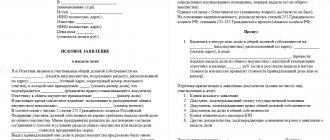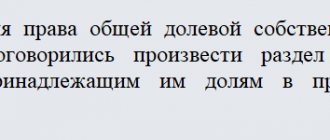Home / Housing disputes / Allocation of a share in a privatized apartment
Privatization allows you to register a municipal apartment as the common property of family members. Co-owners can allocate shares, or they can transfer the residential property to the status of joint ownership. A privatized apartment becomes the common private property of people, with one exception - family members have the right to housing in accordance with their shares.
Living with the whole family under one roof is certainly pleasant. But sometimes life brings surprises and radically changes people's plans. Individual share owners may want to allocate their share in kind, and if this is difficult, for money. Can this be done in the case of privatized housing? What to prepare and where to go? Our article is devoted to answers to these and other questions.
Owner's rights
The procedure for determining shared ownership is regulated by the Civil Code of the Russian Federation and a number of other legislative acts.
The main nuances of allocating a share in accordance with the Civil Code of the Russian Federation:
- Each participant in shared ownership has the right to allocate a share from the common property.
- Property in shared ownership can be divided by voluntary agreement.
- The agreement may be changed in the future with the consent of all shareholders.
- If such an agreement has not been reached, the participant has the right to demand the implementation of his property rights in court.
- One of the owners has the right to receive monetary compensation from other participants if it is not possible to allocate a share in kind due to damage to other participants or due to a legal prohibition.
- Monetary compensation is possible only with the consent of the participant, with the exception of certain cases.
- The owner has the right to monetary compensation for the disproportionality of the allocated property.
- The shares of participants are recognized as equal, unless otherwise provided by law.
- A share in kind is allocated only if technically possible.
Regulatory documents
The entire procedure for allocating ownership shares is based on the existing legislative framework in the country:
- Civil Code of the Russian Federation, Ch. 16: “Common property”;
- Law of the Russian Federation dated July 4, 1991 No. 1541 1 “On the privatization of housing stock in the Russian Federation”;
- Housing Code of the Russian Federation, Ch. 2: “Objects of housing law. Housing Fund”, Art. 18: “State registration of rights to residential premises.”
The need to determine the share of an apartment arises as a result of the transfer of real estate into common ownership and is regulated by Article 245 of the Civil Code of Russia .
Definition of shares
It is very simple to calculate the area that is required by law for each apartment owner. To do this, you need to divide the total area by the number of people. This method works in any case, unless otherwise provided by law.
Exceptions are possible in situations where the owner, at his own expense, has made repairs to the premises or made other inseparable improvements. In this case, he has the right to increase his share in accordance with the funds spent.
If housing was privatized by spouses during marriage, they own equal shares. All children also have the right to equal shares of real estate. Exceptions can be made if the corresponding clauses are in the marriage contract. If only one of the spouses privatized the apartment, he is its sole owner.
After determining the shares, the co-owners can divide all personal accounts to pay for utilities.
Grounds and reasons
For every legal action there must be legal grounds on which their implementation is possible.
The process of separating a part from common ownership into sole ownership is governed by Art. 244 Civil Code of the Russian Federation. It states that the common property of several citizens, by default, is shared, unless there are special instructions. You can select, guided by paragraph 5 of this article, voluntarily, or by court.
When it comes to transmission. The gift agreement, which is most suitable for re-registering a share to another owner, is regulated by Art. 572 of the Civil Code of the Russian Federation. In accordance with the information provided, the gift agreement must be gratuitous and lifetime. You cannot give property with the stipulation that the rights will pass after the death of the donor. Rights are transferred immediately after execution and registration of the agreement.
If you act through the court. You can achieve the allocation of a share in court on the basis of clause 5 of Art. 244 Civil Code of the Russian Federation. A significant inseparable improvement of common property gives the right to increase the share of the person who made such improvements, in accordance with paragraph 3 of Art. 245 of the Civil Code of the Russian Federation.
As judicial practice shows, the decision depends on the consent of other owners to increase the share in accordance with Art. 247 Civil Code of the Russian Federation. Other disputes regarding the transfer of property rights from one person to another depend on the specific situation and require legal justification in court.
Procedure
The procedure itself consists of two main stages:
- Determination of shares. If the owners were able to do this voluntarily, they sign the agreement. Otherwise you will have to go to court. The agreement is signed by all parties to the agreement. It may be changed in the future by general agreement. The document can be certified by a notary, but this is not necessary.
- State registration of property rights in Rosreestr.
For state registration you will need the following documents:
- Passports of all owners. For a minor child - a birth certificate. Separate copies of birth certificates must be made for all children.
- Title documents for the apartment.
- Voluntary agreement. One copy for each of the parties to the transaction, one additional copy for storage in Rosreestr.
Download the agreement on the allocation of a share in the apartment (sample)
State registration also requires payment of a fee. It is divided in equal parts among all participants in the transaction.
After submitting the application, registration of the right is carried out within 10 days. Documents are stored for issue for 1 month, after which they are sent to the archive.
The standard agreement specifies the following information:
- Passport details of the parties to the agreement.
- Address of the house, area of the apartment (general and residential), number of rooms.
- Cadastral number of the apartment.
- Size of shares.
- Information on encumbrances imposed on living space.
Conceptual apparatus
What is a share in an apartment and how to manage it?
Each owner of a share has the right by law to dispose of it at his own discretion. However, any actions with a share in an apartment have some features in comparison with the disposal of an entire property.
Any actions with part of the apartment are possible and strictly regulated by law, but their owners must know some of their features.
The nuances of actions with a share in a privatized apartment are related to its legal status. A share is a legal concept that is not tied to a specific place in a privatized apartment.
It cannot be fenced off, and in some cases even specifically demonstrated indoors.
A share in an apartment is a certain number of square meters owned by a person, without reference to a specific premises within the residential property.
Read on our website about how to give up a share in a privatized apartment in favor of children or parents, as well as how to divide personal accounts in it.
Section options
There are two options for allocating a share:
- Actually. It should be understood that in this case the apartment actually turns into a communal one. Each owner can not only use his share, but sell it or exchange it for another living space. In this case, complete strangers will live in the apartment.
- In monetary terms. The remaining owners compensate the cost of the share to the relative who wishes to allocate it.
Allocation order:
- Negotiable. It is carried out by voluntary agreement of all owners of living space.
- Judicially.
Stages of privatization
Thus, the privatization of the room will take place according to the following algorithm :
- Personal accounts are separated.
- Two different social tenancy agreements are drawn up.
- Technical documentation for the allocated premises is prepared.
- An application for privatization and a set of documents for it are being prepared (copies of passports, a certificate of the composition of residents, written notarized refusals if someone registered in the room does not want to participate in privatization, etc.).
- An agreement is signed to transfer ownership of the room.
- The agreement, together with the application for registration and a receipt for payment of the fee, is submitted to Rosreestr in one of the following ways.
- The new owner receives an extract from the Unified State Register of Real Estate. From this moment on, he is the full owner of the room, has all rights in relation to it and bears the responsibility established by law.
Allocation in kind
Such a division of living space between owners is possible only if the layout of the apartment allows various auxiliary rooms (such as a kitchen, corridor, bathroom) to be transferred to separate use, as well as a separate entrance to the room.
If such a possibility does not exist, the procedure for joint use of common property can be determined in court. When one of the co-owners gets control of an isolated part of the apartment, he loses the right to use the rest of the living space. If the court has determined the order of joint use, all co-owners can still enjoy the right of common ownership.
As practice shows, the layout of most domestic apartments does not allow for a separate entrance and separate use of the kitchen and bathroom. Therefore, most often the court makes a decision to allocate isolated rooms to each owner, while the common premises remain in shared ownership.
The allocation of a share in kind is carried out only if this is possible in practice. For example, this is impossible in a one-room apartment, since each of the owners will not be able to get an isolated room.
Download the agreement on the allocation of a share in kind (sample)
Actions in a privatized apartment
To go to court you must prepare:
- certificates of ownership;
- documents serving as the basis for the emergence of this right;
- documents confirming identity under the law, their copies;
- documents confirming the presence of family ties between the owners;
- other documents that make sense to attach in each specific situation.
With these documents, you should apply to the court with a claim for the allocation of shares to the owners. If this is possible, after registering the relevant decision in Rosreestr, new certificates confirming ownership will be issued, with changes made to them.
Allocation in monetary terms
The easiest way to do this is by voluntary agreement. In this case, one of the owners buys out the share of the others and becomes the sole owner of the apartment.
The court may order monetary compensation to be paid to the owner even without his consent. This is done in cases where the share required by law is too small. In such a situation, it is impossible to allocate an isolated room, since its area is much larger than required, and the rights of other owners will be infringed.
After receiving material compensation, the citizen is deprived of all property rights to a share in the real estate.
Allocation of shares to children based on maternity capital
In case of common joint property, it is allowed to assign a share to a child under 18 years of age, but he has the right only to use the property - he will be able to dispose of it upon reaching adulthood.
If housing is purchased using maternal capital, then the children are allocated shares. If it is not possible to register the shares immediately, the owner can do this later within the time limits established by law - by drawing up an agreement or a gift deed. The mother needs to draw up a notarized obligation to allocate shares to the children.
How to properly formalize the allocation of shares in maternity capital.
A notarial obligation is required if, on the date of receipt of capital, the housing was not registered as private property or it is registered to 1 owner. This is due to the following circumstances:
- the apartment was taken out on a mortgage, the loan was issued to one or both spouses, and at that time they were childless;
- the apartment was taken out on a mortgage, which has not yet been paid;
- the apartment is located in a building under construction that has not yet been put into use;
- one spouse or husband and wife – members of a housing cooperative;
- the family lives in a house that was built before receiving capital: the owners of the property are one or both spouses, but the children formally do not have ownership rights.
The obligation must indicate the following information:
- date, place of compilation;
- information about parents: full name, passport details, residential address;
- indication of the direction of use of maternal capital;
- description of the apartment (address, details of title documentation);
- obligation to allocate a share;
- date of document preparation, signature and transcript;
- notary's mark.
The share must be allocated to a minor child within a 6-month period. It starts counting from the moment the legal possibility of carrying out the procedure arises - for example, the house is put into use, the mortgage is fully repaid.
The obligation to allocate is drawn up by the woman, her husband or both spouses (if they are shareholders under the DDU, members of a housing cooperative, co-borrowers).
When contacting a notary, you must have with you:
- passports;
- certificate of marriage;
- certificate for maternal capital;
- birth certificates of children;
- title documentation for the apartment;
- mortgage agreement;
- adoption agreement if an adopted child is being raised in the family.
The completed and certified obligation is transferred to the Pension Fund of the Russian Federation.
Allocation of a share when buying a home with a mortgage
If it is necessary to allocate a share to a minor child in a mortgage, the procedure is as follows:
- make the final payment, receive a loan repayment certificate from the bank;
- remove the encumbrance through the MFC or Rosreestr, receive an extract about its absence;
- allocate a share to the child;
- contact Rosreestr or the MFC again to formalize the division of the apartment into shares.
Allocation of shares in other situations
If the spouses are shareholders under the DDU or members of a housing cooperative, then after the building is put into operation they receive ownership of the apartment. The date of signing the acceptance certificate is the moment of receipt of housing. Over the next 6 months, it is necessary to formalize the allocation of shares for children and spouse.
When reconstructing or constructing a house, the period begins to count from the moment the spouses receive permission to use the building, which is issued by the local administrative authorities.
Options for allocating shares to children
There are two ways to allocate shares to children - through an agreement or a gift deed.
The agreement is drawn up by a notary. The document contains information about spouses and children, real estate, purchasing an apartment through matkapital, and the shares that will go to each owner. After this, you need to obtain an extract from the Unified State Register.
When drawing up a donation agreement, the document contains information about the apartment, an approval for the free allocation of a share, and information about all participants in the process. The agreement must be registered with Rosreestr.
Responsibility for violation of legal requirements
There are no penalties for failure to provide shares to children . However, if there are controversial situations, children have the right to go to court and demand that the share be transferred to themselves. The court may establish the size of shares according to the contribution of each family member to the purchase of an apartment or in equal parts if this contribution cannot be determined.
If the spouses cashed out maternity capital, which is prohibited, and used public funds for other purposes, they may be prosecuted. Punishment – return of maternity capital, a fine of up to 120 thousand rubles or imprisonment of up to 2 years.











